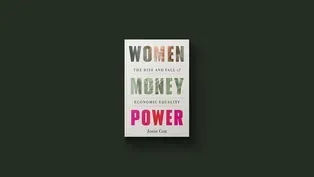
Bankman-Fried sentenced to 25 years in prison for FTX fraud
Clip: 3/28/2024 | 5m 46sVideo has Closed Captions
Bankman-Fried sentenced to 25 years in prison for massive FTX fraud
Former cryptocurrency mogul Sam Bankman-Fried was sentenced to 25 years in prison for what prosecutors said was one of the biggest financial crimes in U.S. history. Bankman-Fried was found to have stolen at least $8 billion from FTX customers. William Brangham discussed more with David Yaffe-Bellany of The New York Times.
Problems with Closed Captions? Closed Captioning Feedback
Problems with Closed Captions? Closed Captioning Feedback
Major corporate funding for the PBS News Hour is provided by BDO, BNSF, Consumer Cellular, American Cruise Lines, and Raymond James. Funding for the PBS NewsHour Weekend is provided by...

Bankman-Fried sentenced to 25 years in prison for FTX fraud
Clip: 3/28/2024 | 5m 46sVideo has Closed Captions
Former cryptocurrency mogul Sam Bankman-Fried was sentenced to 25 years in prison for what prosecutors said was one of the biggest financial crimes in U.S. history. Bankman-Fried was found to have stolen at least $8 billion from FTX customers. William Brangham discussed more with David Yaffe-Bellany of The New York Times.
Problems with Closed Captions? Closed Captioning Feedback
How to Watch PBS News Hour
PBS News Hour is available to stream on pbs.org and the free PBS App, available on iPhone, Apple TV, Android TV, Android smartphones, Amazon Fire TV, Amazon Fire Tablet, Roku, Samsung Smart TV, and Vizio.
Providing Support for PBS.org
Learn Moreabout PBS online sponsorshipWILLIAM BRANGHAM: The former FTX crypto currency mogul Sam Bankman-Fried was sentenced to 25 years in prison today for what prosecutors said was one of the biggest financial crimes in U.S. history.
A judge handed down that sentence after a jury this fall found Bankman-Fried guilty of seven different counts relating to fraud and money laundering.
Bankman-Fried was found to have stolen at least $8 billion from FTX customers.
He was also ordered to pay $11 billion today.
Bankman-Fried has said he will appeal.
For a closer look at this case, we're joined by David Yaffe-Bellany.
He's covered this saga for years for The New York Times.
David, thank you so much for being here.
You were in the courtroom today when that sentence was handed down.
I wonder, what stood out to you the most from the judge's sentence?
DAVID YAFFE-BELLANY, The New York Times: I think what I was struck by the most was some of the language that the judge used to kind of justify the length of the sentence.
He didn't just say, these were really serious crimes.
He said that Sam Bankman-Fried had to go to prison for 25 years because, if he was let out any earlier, he might commit more crimes.
Basically, there's this sense that he hasn't really expressed remorse for what happened, and were he to get out, he might pitch a new company and try to commit a similar fraud to the one that brought down FTX.
WILLIAM BRANGHAM: Is this because, all along, Bankman-Fried really hasn't expressed a great deal of remorse about this, which I know judges love to see?
DAVID YAFFE-BELLANY: Yes, I mean, it's complicated.
He will say that he's sorry about what happened and that he's apologized to customers, he's apologized to employees of FTX, but he obviously challenged the charges against him.
He's planning to appeal.
So he hasn't apologized for committing crimes, because it remains his position that he hasn't committed any crimes.
But that certainly hurt him at the sentencing stage.
WILLIAM BRANGHAM: For people who have not been following this as closely as you have, can you just remind us of the basic sort of flow of what happened here?
How did FTX come crumbling down?
DAVID YAFFE-BELLANY: Sure.
So, just 18 months ago, Sam Bankman-Fried was a huge star in the business world.
He ran a cryptocurrency exchange, FTX, which was basically a platform where you could take your dollars and spend them to buy Bitcoin or Ether or other cryptocurrencies.
And you could also store your crypto on the platform.
So it kind of operated as a bank as well.
And it became really popular as the crypto industry grew and grew.
And then, in November 2022, there was essentially a run on the bank.
And that exposed a big $8 billion hole in the money that FTX was supposed to be holding on behalf of its customers.
And that kind of kick-started the series of events that kind of brought the whole edifice crashing down.
WILLIAM BRANGHAM: And so those people who had -- quote, unquote -- "banked their money" in his exchanges, they lost all the money?
Those are the victims in this case?
DAVID YAFFE-BELLANY: Those are sort of one subset of the victims.
They're probably the largest subset.
But the other victims include venture capital investors who put in more than a billion dollars into FTX and also lenders who gave money to companies in Bankman-Fried's empire.
WILLIAM BRANGHAM: So the $11 billion that he's been ordered to pay, who is that or where is that supposed to go?
DAVID YAFFE-BELLANY: That's actually going to the U.S. government.
That's not restitution that's going to victims.
But, really, that number is kind of academic because Bankman-Fried does not have $11 billion sitting around that he can just disburse to people.
And really the root for recoveries for the customers of FTX is through the bankruptcy process.
So you have got a team of lawyers that took over the exchange after it collapsed and have spent the last almost year-and-a-half kind of cobbling together assets wherever they can find them to try to create a pool of funds that can be returned to the people who lost their money.
WILLIAM BRANGHAM: But, so far, those people have not yet been made whole, but that is the hope and/or expectation?
DAVID YAFFE-BELLANY: That's the hope.
And the bankruptcy lawyers have said they're expecting to make customers whole, but what being made whole means is complicated.
They will receive the dollar value of their holdings on the FTX platform as of November 2022, when the bankruptcy happened.
So that doesn't account for the rapid surge in cryptocurrency prices over that period.
So if you had one Bitcoin on FTX and it was worth $20,000 in November, you will get $20,000 back, even though that Bitcoin would be worth $70,000 today.
WILLIAM BRANGHAM: I see.
Many people have seen this case as kind of an overarching stain on cryptocurrency writ large.
And I wonder, do you think that's fair, and is that is actually what is happening?
Like, does this say anything about cryptocurrency itself, or is this just about one person's potential crime here?
DAVID YAFFE-BELLANY: I think there are specific characteristics of the crypto industry that sort of helped enable this fraud.
One sort of mechanism that Bankman-Fried was using to kind of cover up some of his crimes was that he was kind of inventing new currencies, new digital currencies, and then putting them up as collateral to borrow actual money from lenders.
And so that's sort of a unique aspect of this kind of strange world of digital money that kind of helped enable the fraud.
I think it's also the case that the crypto world has kind of attracted a type of person who's sort of inclined toward gambling, who wants to take lots of risks.
And that sort of says a lot about the culture of the industry, and it's part of what laid the foundation for this massive disaster.
WILLIAM BRANGHAM: All right, David Yaffe-Bellany of The New York Times, thank you so much.
DAVID YAFFE-BELLANY: Thanks for having me.
Blumenthal on Lieberman's 'ferociously independent' legacy
Video has Closed Captions
Sen. Blumenthal on Joe Lieberman's legacy: 'He was ferociously independent' (6m 29s)
A Brief But Spectacular take on spreading 'Rolligion'
Video has Closed Captions
A Brief But Spectacular take on spreading 'Rolligion' (3m 15s)
Cuban musicians struggle to reach American audiences
Video has Closed Captions
Cuban musicians struggle to reach American audiences amid shifting diplomatic relations (6m 51s)
MLB opens season with controversy over 'papery' uniforms
Video has Closed Captions
Major League Baseball opens season with controversy over 'papery' uniforms (7m 14s)
Sister of Evan Gershkovich on fight to free him from Russia
Video has Closed Captions
Sister of Evan Gershkovich discusses fight to free him from Russian detention (9m 31s)
'Women Money Power' chronicles fight for economic equality
Video has Closed Captions
New book 'Women Money Power' chronicles long fight for economic equality (7m 21s)
Providing Support for PBS.org
Learn Moreabout PBS online sponsorshipSupport for PBS provided by:
Major corporate funding for the PBS News Hour is provided by BDO, BNSF, Consumer Cellular, American Cruise Lines, and Raymond James. Funding for the PBS NewsHour Weekend is provided by...

















